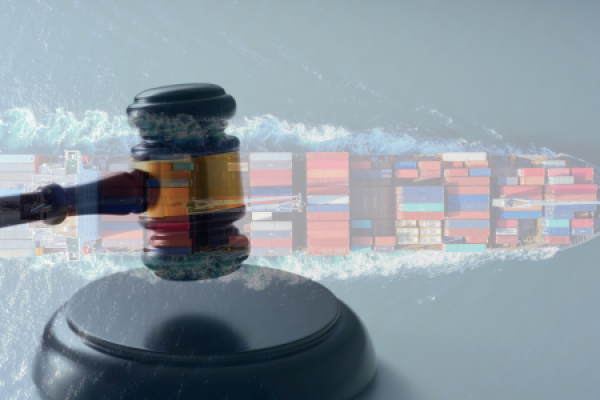Misdelivery: A mere receipt or a contract of carriage?
Misdelivery without a bill of lading carries legal risk, but liability depends on contract context. In The Sienna, the bill became contractual post-novation, yet no loss was found.

Articles

Despoina Kafka
Published: 5月 13, 2025
Agreeing to deliver of cargo without surrender of a bill of lading against a Letter of Indemnity (“LOI”) is a not an uncommon practice but brings with it:
The risk of claims for misdelivery, which are likely to be for very significant sums; and
If so, the uncertainty of enforcing rights under the LOI [www.steamshipmutual.com/publications/articles/delivery-of-cargo-without-production-of-bills-of-lading-a-recap112019]; and
There in is no Club cover for any resultant liability “Unless and to the extent that the Directors shall in their absolute discretion otherwise determine”.
It is not necessarily the case that a carrier facing a claim for misdelivery will be liable to pay that claim. In the Alhani [2018] the 12-month time bar in Article III rule 6 of the Hague Visby Rules was held to apply to misdelivery claims where the misdelivery was simultaneous with discharge, and in the recent Supreme Court decision in FIMBank p.l.c. v KCH Shipping Co. Ltd (The Giant Ace) the same 12-month time bar also applied to a post-discharge misdelivery claim.
While there is always considerable risk involved if Members agree to deliver cargo without production of an original bill of lading there are, however, other circumstances in which claims for misdelivery might be rejected. This will depend on the facts of any particular claim, but one example is the 2023 case of Unicredit Bank A.G. v Euronav N.V. (The Sienna) in which the Court of Appeal had to consider the following issues:
Whether a bill of lading in the hands of voyage charterers is a ‘’mere receipt’’ after the charter had been novated and therefore,
Whether discharge of the cargo without presentation of the bill of lading was a breach of contract of carriage evidenced by the bill of lading entitling the claimant to damages for mis-delivery.
Background
On 06 February 2020, BP Oil International Ltd (‘’BP’’) voyage chartered the vessel ‘’The Sienna’’ (the ‘’vessel’’) from owners Euronav N.V (‘’Euronav’’). Euronav issued a bill of lading to BP (voyage charterers and shippers). BP sold the cargo of oil to Gulf Petrochem FZC (‘’Gulf’’). Unicredit Bank A.G (‘’Bank’’) financed the purchase by Gulf and paid BP the purchase price, so Gulf asked BP to endorse the bill of lading to the Bank directly.
Due to COVID the endorsement to the Bank took place several days after the discharge, hence BP remained in possession of the bill of lading. However, before the discharge, Gulf, BP and the Bank entered in a novation agreement by which Gulf replaced BP as charterers.
Gulf instructed Euronav to discharge the cargo to them in Oman by STS transfer without production of the bill of lading against a LOI. Euronav followed Gulf’s instructions, but the Bank having paid for the cargo, claimed it should have received the bill of lading and thus control of the cargo. Because it did not, and the cargo was delivered without presentation of the bill of lading, the Bank sued Euronav for misdelivery.
High Court
It is common ground that where a holder of the bill of lading (BP in this case) is also the charterer the bill of lading is not the contract of carriage of goods but a ‘’mere receipt’’ that does not contain or evidence any contractual terms. In these circumstances, the contract of carriage is to be found within the charterparty. However, when the bill of lading is then indorsed to a third party, it attains contractual status upon indorsement on the basis that “a new contract appears to spring up between the ship and the consignee on the terms of the bill of lading” (Tate & Lyle Ltd. v Hain Steamship Co. (1936) 55 Ll. L. Rep. 159, 174)
In the Sienna the indorsement to the Bank was post discharge hence the issue was whether the bill of lading attained contractual force when the charter was novated to Gulf (new charterers) and, therefore, whether rights of suit vested respectively in the Bank upon indorsement under s. 2 of the Carriage of Goods by Sea Act 1992 (COGSA)* thereby allowing the Bank to claim for mis-delivery under the contract, due to the delivery without production of bill of lading.
The Bank’s position was that by virtue of the novation agreement, the billl of lading ceased to be a mere receipt and a contract came into existence allowing them to claim damages for breach of contract. There was no reason to distinguish the situation in this case from the position which would result if the bill of lading had been indorsed at the same time as the novation and/or before the discharge.
Surprisingly, the court did not agree; there was ‘’no reason to conclude that the parties intended that their relationship would be governed by the terms of the Bill of Lading at the point where the contractual relationship between them in the charterparty had just been terminated’’ Hence, at the time of the discharge, Euronav contractual obligations were set out in the Charterparty, which was to discharge without production of the Bill of Lading if ordered to do so by the voyage charterer. As such, there was no breach as ‘’the B/L did not contain the contract of carriage between the Owners and the lawful holder of the Bill, BP, on or after 6 April 2020 (being the date of the Novation Agreement) and prior to the alleged mis-delivery’’ despite the fact that the lawful holder of the bill of lading, BP, had at that time ceased to be the charterer.
Moreover, it was held that even if there had been any such breach, it did not cause the Bank's loss, because the Bank was aware of the intended delivery without presentation of the bill and Bank would have authorised or permitted Euronav to do so.
The Bank appealed on both grounds.
Court of Appeal
The first ground of appeal was determined in favour of the Bank. This was so on two grounds:
The position governing a bill in the hands of a charterer who ceases to be charterer should be determined by the presumed intention of the parties, subject always to any contrary agreement or circumstances which demonstrate a contrary intention.
It is in the interests of both the carrier and the charterer that their relationship should be contractual for so long as the latter has an interest in the goods and the voyage. While the charterparty subsists, the charterparty usually performs that function to the exclusion of the bill of lading. But if the charterparty ceases to govern, both parties would presumptively expect the completion of the voyage to be carried out on the terms of a contract, not in a legal vacuum. The bill of lading provides that function.
Even if that was wrong s. 2(1) of COGSA1 operates retrospectively so once the bill of lading was endorsed to the Bank after the discharge a contract on the terms of the bill of lading came into existence which had been breached by discharge without production of the Bill of Lading A contract not only “springs up”, but is treated by COGSA as having always existed and the bill of lading was not a ‘’mere receipt’’ in the hands of BP at the time of discharge.
However, the judgment of the High Court regarding the causation was upheld. Had Euronav initially complied with the obligation not to discharge without production of the bill of lading, what would have happened in practice is that they would have sought and obtained express consent to do so from the Bank as ’the obligation to deliver against a bill of lading is a contractual one which can be varied by express consent to the contrary’’ (Popplewell LJ).
In those circumstances delivery without production of the bill of lading would no longer have been a breach of the bill contract and would therefore have caused no loss.
The appeal was therefore dismissed.
Conclusion
While borne out of unusual circumstances caused by the pandemic, the decision brings welcome guidance surrounding (i) the circumstances in which a contract of carriage can ‘’spring up’’, and (ii) the presumption is that a bill of lading is a mere receipt for any period of time where:
the carrier is the owner under the charterparty; and
the bill of lading holder is the charterer.
The decision is also some comfort to carriers that agree to deliver cargo without presentation of a bill of lading since liability for misdelivery claims will not necessarily succeed. In this respect the English courts have shown a willingness to consider all the circumstances in which the cargo was delivered including the role played by those financing the sale of the cargo. An example is FIMBank plc v Discover Investment Corporation (The Nika) [2021] 1 Lloyd's Rep) where the banks were aware of discharge at warehouses without presentation of bill of lading. However, each case will be decided on its own facts. Significant risks remain in agreeing to deliver cargo without presentation of a bill of lading so careful consideration is required not only to whether to agree to do so but also to the wording and security provided by any LOI.
1 “the lawful holder of a bill of lading….shall, (by virtue of becoming the holder of the bill…) have transferred to him and vested in him all rights of suit under the contract of carriage as if he had been a party to that contract”.
Related Articles
Articles
Too Late to Litigate: Post-Discharge Misdelivery Claims
The UK Supreme Court ruled that the one-year time bar under the Hague-Visby Rules applies to misdelivery claims even after discharge. This decision in The Giant Ace emphasises the urgency of prompt legal action in maritime disputes.
Articles
Articles
Misdelivery Of Cargo After Discharge
Does the 12-month Hague-Visby Rules time bar apply?
On 24 May 2023 the Court of Appeal handed down its judgment in FIMBANK PLC and KCH SHIPPING CO LTD dealing with the issue of whether the 12-month time bar under the Hague-Visby Rules applies to claims for misdelivery of cargo after discharge.
Articles



